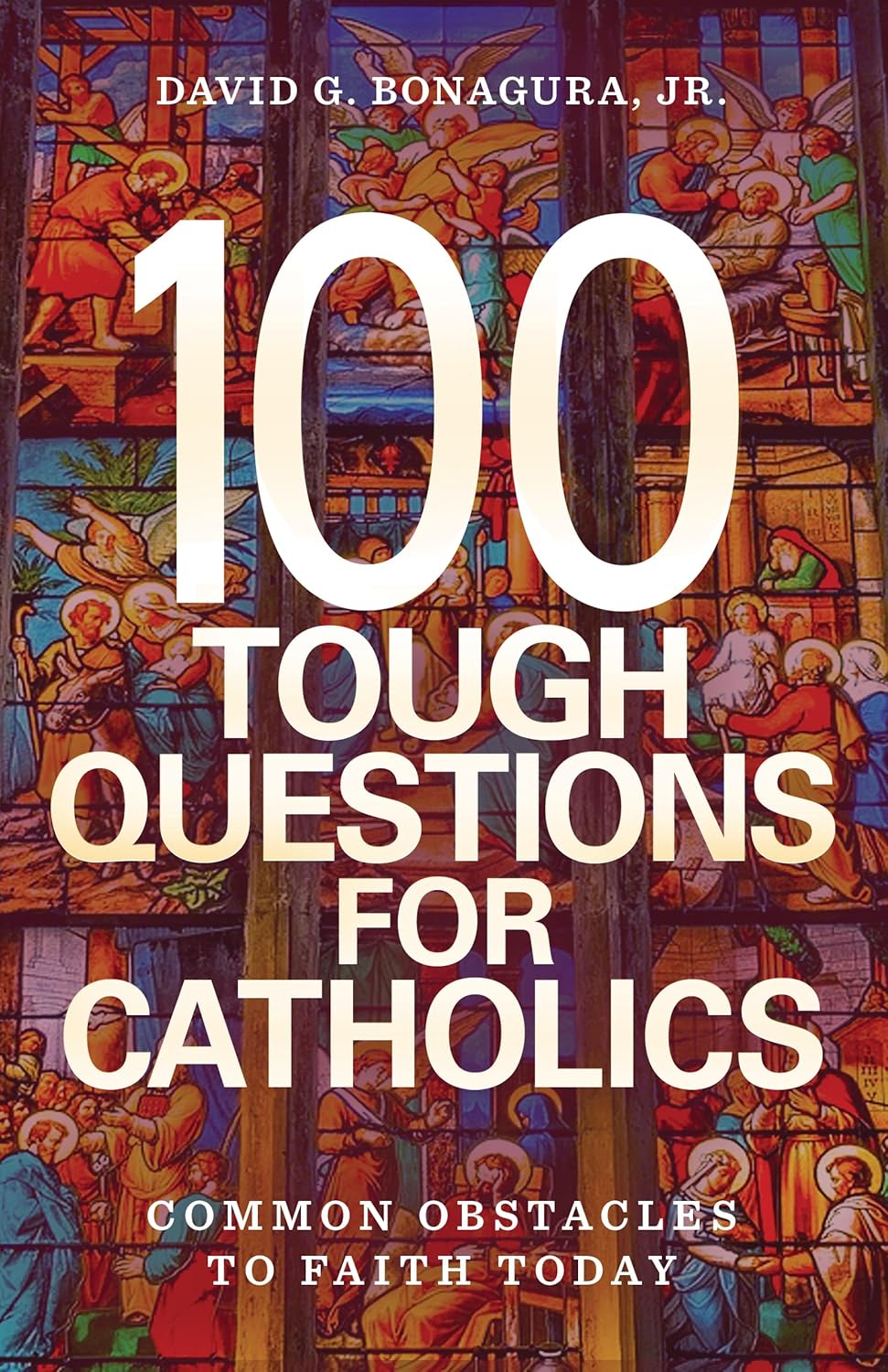
By David Bonagura Jr.
Sophia Institute Press, 2025.
Paperback, 176 pages, $17.95.
Reviewed by David Weinberger.
“In the day to day trenches of adult life,” writes David Foster Wallace, “there is actually no such thing as atheism. There is no such thing as not worshipping. Everybody worships. The only choice we get is what to worship. And the compelling reason for maybe choosing some sort of God or spiritual-type thing to worship…is that pretty much anything else you worship will eat you alive.”
If Wallace is right, if we all naturally worship, then we all have faith in something, whether that something is power, glamour, science, intelligence, money, pleasure, politics, family, or God. Furthermore, if we all have faith, and if we want that faith to be reasonable, we should not only subject it to scrutiny but demand that it be grounded in reason and evidence.
Christianity, especially Catholic Christianity, maintains exactly that, and a new book helps make that clear. In 100 Tough Questions For Catholics: Common Obstacles To Faith Today, author and professor David G. Bonagura, Jr. gives bite-sized answers to dozens of big questions about the faith. Such questions include:
- “What is God?”
- “How do we know Jesus really existed?”
- “Do miracles contradict science?”
- “If God is omniscient [all-knowing], how can we have free will?”
- “Why do Catholics go to confession?”
- “What happens after we die?”
Perhaps the first and most important question, though, is whether God exists. After all, if God does not exist, Christianity is meaningless. So, why think that He does? Bonagura highlights a number of reasons, including the so-called “argument from contingency,” which holds that things we experience in the world depend on other things for their existence, and that ultimately there must be something independent that accounts for it all, and this we call “God.” For example, I depend on food, oxygen, and water for my existence, but each of these in turn depends on other things. The existence of water, for instance, depends on molecules, which themselves depend on atoms, which further depend on quarks, which depend on yet other things. Yet no matter how far this chain goes—even if it goes to infinity—there must be something that grounds the existence of the chain itself. To see why, consider a train of boxcars. Even if the number of boxcars were infinite, without an engine imparting motion to it, the train simply would not move. Likewise, without an independent being imparting existence to an infinite web of dependent beings, the web itself would not exist.
Besides this argument, though, Bonagura notes other ways of knowing that God exists, including personal experiences, which, he stresses, “are often more convincing reasons to believe in Him than the rational ones.”
Moreover, equally important to knowing whether God exists is knowing whether Jesus existed. For if we cannot say whether Jesus existed, we cannot say whether he rose from the dead. And if Jesus did not rise from the dead, then Christianity once more becomes meaningless. As Bonagura documents, however, the evidence for Jesus is strong. Not only do several New Testament sources record his existence, but close pagan and Jewish contemporaries do too, including Tacitus, Josephus, Pliny the Younger, and Suetonius (among others). In fact, as Bonagura observes, “there is as much evidence for Jesus’ existence as for many other famous figures of antiquity, including Socrates, Plato, Aristotle, Alexander the Great, Cicero, and Caesar.”
Aside from examining this evidence, including what we know about Jesus’ identity and deeds, the book turns to a question we all inevitably ask ourselves at one point or another: What happens after we die? Is there a “heaven,” and what might it be like? Jesus, of course, proclaims the reality of heaven. He describes it as a state of total and unending joy: “I will see you again and your hearts will rejoice,” he tells his disciples in John’s gospel, “and no one will take your joy from you.” Similarly, as Bonagura relays in the book, here is how one recent pope describes it:
[Heaven is] the supreme moment of satisfaction, in which totality embraces us and we embrace totality…It would be like plunging into the ocean of infinite love, a moment in which time—the before and after—no longer exists. We can only attempt to grasp the idea that such a moment is life in the full sense, a plunging ever anew into the vastness of being, in which we are simply overwhelmed with joy.
Furthermore, if the testimony of Near-Death Experiences (NDEs) provides any clues, this charming description of heaven corroborates the awe-inspiring reports from those who have had brushes with death and who have lived to tell their stories.
Besides this, Bonagura covers scores of other topics, including questions about the Church, evil, prayer, science, other religions, morality, and more. For Catholics seeking answers to rational questions about their faith, 100 Tough Questions For Catholics is a helpful place to begin.
David Weinberger formerly worked at a public policy institution. He can be found on Twitter @DWeinberger03.
Support the University Bookman
The Bookman is provided free of charge and without ads to all readers. Would you please consider supporting the work of the Bookman with a gift of $5? Contributions of any amount are needed and appreciated!